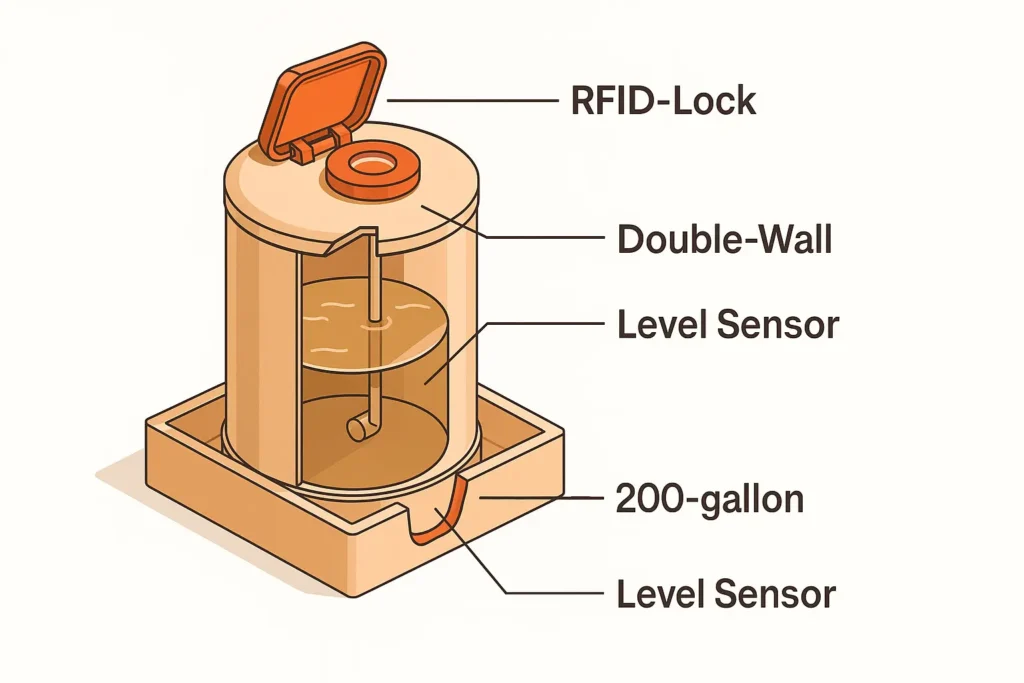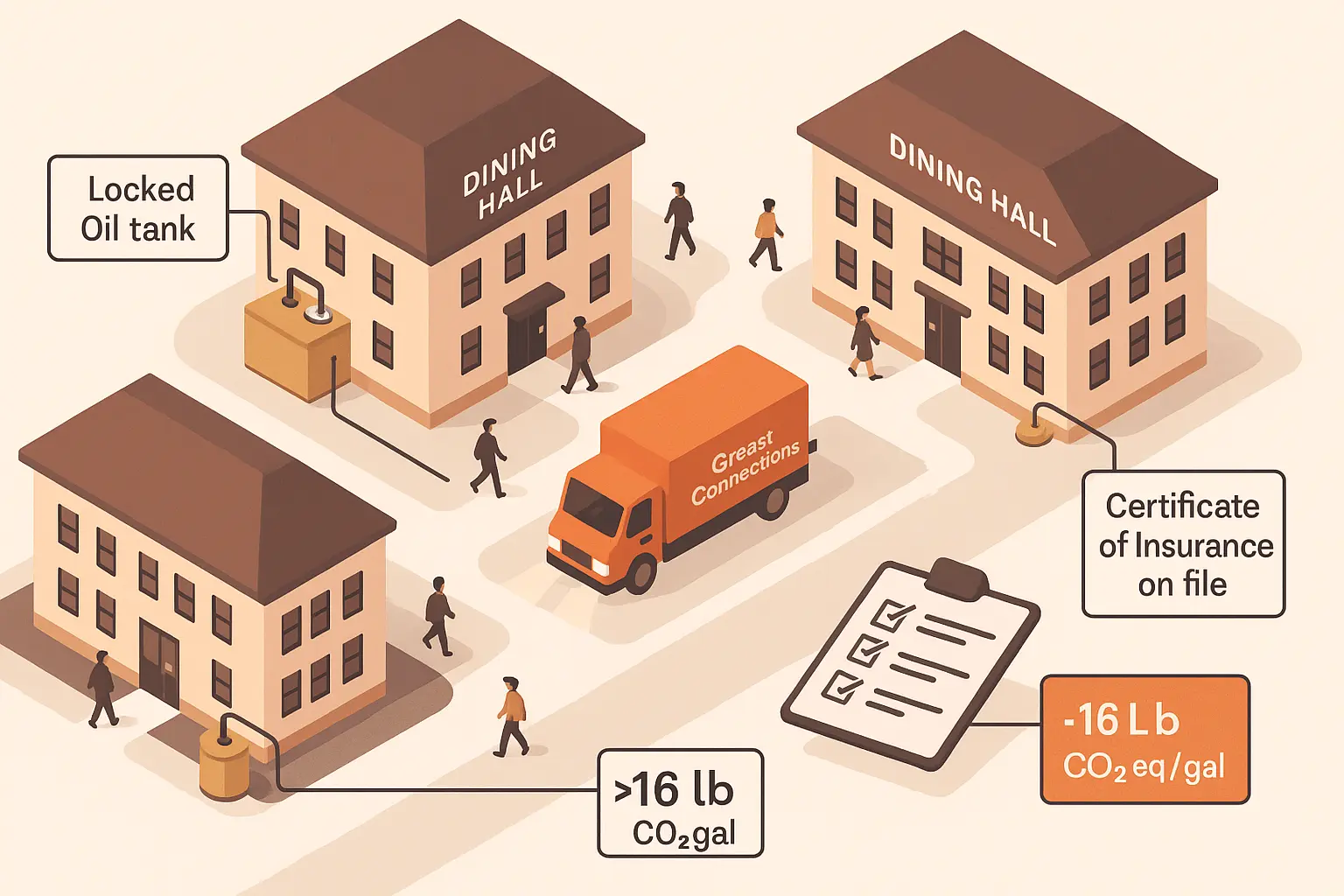Table of Contents
Stop Spills Before They Start: Why Insurance & Timing Matter
A fryer leak on a tile floor needs only eight seconds to turn into a slip claim. University risk offices know it, which is why every waste oil vendor must hand over a current Certificate of Insurance (COI) before the first pickup. Standard thresholds run $3 million general liability, $3 million auto, and $5 million pollution coverage, with the school named as “additional insured.”
Grease Connections keeps a COI on file for each of its Florida, Georgia, and New Jersey fleets and emails renewals 30 days before expiration, eliminating frantic paperwork chases. Regular, pre scheduled routes shrink risk further: locked steel tanks are emptied on the same weekday every week, so oil never piles high enough to overflow during finals week.
Crunching the Numbers: 5 000 Meals → Two 200 Gallon Pickups Weekly
Industry studies peg daily fryer waste around 35 lb, roughly 4 gal, for a fast food site. Scale that to three high traffic halls serving 5 000 meals and you’re looking at 160 to 180 gal of grease every three days. Campus EHS offices recommend clearing tanks before they pass 70 % capacity to avoid splash hazards.
| Metric | Value | Source |
|---|---|---|
| Meals per day | 5 000 | Dining Services projection |
| Oil generated | ≈ 180 gal / 3 days | RTI waste oil study |
| Recommended pickup | 2× 200 gal / week | Grease Connections dispatch data |
Vendor Checklist: Insurance Levels Universities Demand
| Coverage | Typical University Minimum | Grease Connections Standard |
|---|---|---|
| General Liability | $3 M / occurrence | $5 M umbrella |
| Auto Liability | $3 M combined | $5 M combined |
| Pollution / CPL | $5 M | $5 M |
| Workers Comp | Statutory | Statutory + $1 M EL |
Universities also insist the policy be primary & non contributory and include a waiver of subrogation. Grease Connections provides those endorsements in a single PDF sent during onboarding, saving purchasing officers a back and forth email chain.
Containers That Pass Inspection And Student Foot Traffic
Campus kitchens juggle limited dock space, so containers must stay tight, lockable, and rodent proof. Florida Tech’s dining team switched to sealed 200 gallon outdoor totes after open barrels attracted gulls. Grease Connections delivers stainless or HDPE options (55 to 330 gal) with double wall spill pans and RFID lids that log every open/close for audit trails.

Route Reliability: Three Halls, One Manifest
With all kitchens less than a mile apart, the dispatcher builds a single milk run: Hall A → Hall B → Hall C, time stamped in order. Digital manifests upload to the University’s waste portal within 24 hours, satisfying state FOG reporting and internal audits. In hurricane season Florida, backup trucks stand by 60 miles inland; Georgia and New Jersey fleets keep similar redundancy, so pickups continue even when campuses close for weather.
Compliance Made Simple: Grease Connections Coverage in FL, GA & NJ
Grease Connections runs next business day routes in every county across Florida, Georgia, and New Jersey, with emergency same day service for overflow calls. The company is licensed under each state’s FOG or Class D program and renews EPA generator IDs annually, paperwork your risk office never has to chase. Insurance, manifests, and safety data are stored in a client portal, so dining staff can pull them during surprise inspections.
Grease Connections connects local kitchen managers to route maps and rebate calculators.
Sustainable Outcomes: From Fryer to Biofuel And ESG Points
Each gallon of fryer oil recycled into biodiesel prevents 16 lb CO₂ eq from entering the atmosphere. Grease Connections issues an annual certificate of gallons collected and carbon avoided, data accepted by CDP and GRI reporting frameworks. Schools have leveraged that certificate to boost STARS sustainability scores and secure green bond funding.
Onboarding in Two Emails, Not Ten
- Request COI & W 9. You receive them within four business hours.
- Confirm tank size & first pickup date. Dispatch schedules the route and sends a calendar invite to each hall lead.
That’s it, purchasing never touches another form. University of Illinois’ vendor policy requires only that the COI stay current; automated renewals handle that.
Quick Answers for Facility Managers
- How fast can you respond to an oil spill? Same day in metro areas; four hour average.
- Can we change pickup frequency mid semester? Yes, dispatch updates routes weekly, so exam week volume spikes are covered.
- Is there a cost? Pickup is free; rebates begin once volume passes quarterly thresholds.
The Bottom Line
When three busy dining halls pour out a river of fryer oil, predictable pickups and rock solid insurance keep kitchens safe and auditors calm. Grease Connections’ licensed fleets across Florida, Georgia, and New Jersey tick every university box, so the only thing students taste is lunch, not liability.









